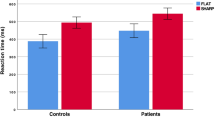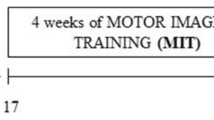Abstract
Individuals with Parkinson’s disease (PD) have deficits in reach-to-grasp (RTG) execution and visuospatial processing which may be a result of dopamine deficiency in two brain regions: primary motor cortex (M1) and dorsolateral prefrontal cortex (DLPFC). We hypothesized that improvement following M1 stimulation would be the result of a direct impact on motor execution; whereas, DLPFC stimulation would improve the role of DLPFC in visuospatial processing. The aim of pilot study was to investigate the effects of HF-rTMS on RTG performance by stimulating either M1 or DLPFC. Thirty individuals with PD participated (H&Y stages I–III). All of them were more affected on the right side. Participants were allocated into three groups. The DLPFC group received HF-rTMS over left DLPFC; while, the M1 group received HF-rTMS over left M1 of extensor digitorum communis representational area. The control group received HF-rTMS over the vertex. Before and immediately post HF-rTMS, right-hand RTG performance was measured under no barrier and barrier conditions. Additionally, TMS measures including motor-evoked-potential (MEP) amplitude and cortical silent period (CSP) were determined to verify the effects of HF-rTMS. For the results, there were no significant differences among the three groups. However, only the M1 group showed a significant decrease in movement time immediately after HF-rTMS for a barrier condition. Moreover, the M1 group showed a near-significant increase in hand opening and transport velocity. As for the DLPFC group, there was a near-significant increase in temporal transport-grasp coordination and a significant increase in velocity. Increased MEP amplitudes and a significantly longer CSP in the M1 and DLPFC groups confirmed the effects of HF-rTMS. Regarding non-significant results among the three groups, it is still inconclusive whether there were different effects of the rTMS on the two stimulation areas. This is a preliminary study demonstrating that HF-rTMS to M1 may improve RTG execution; whereas, HF-rTMS to DLPFC may improve visuospatial processing demands of RTG.



Similar content being viewed by others
References
Alberts JL, Saling M, Adler CH, Stelmach GE (2000) Disruptions in the reach-to-grasp actions of Parkinson’s patients. Exp Brain Res 134:353–362. https://doi.org/10.1007/s002210000468
Alberts JL, Saling M, Stelmach GE (2002) Alterations in transport path differentially affect temporal and spatial movement parameters. Exp Brain Res 143:417–425. https://doi.org/10.1007/s00221-002-1005-0
Alexander GE (2004) Biology of Parkinson’s disease: pathogenesis and pathophysiology of a multisystem neurodegenerative disorder. Dialogues Clin Neurosci 6:259–280
Avenanti A, Coccia M, Ladavas E, Provinciali L, Ceravolo MG (2012) Low-frequency rTMS promotes use-dependent motor plasticity in chronic stroke: a randomized trial. Neurology 78:256–264. https://doi.org/10.1212/WNL.0b013e3182436558
Ballard IC, Murty VP, Carter RM, MacInnes JJ, Huettel SA, Adcock RA (2011) Dorsolateral prefrontal cortex drives mesolimbic dopaminergic regions to initiate motivated behavior. J Neurosci 31:10340–10346. https://doi.org/10.1523/JNEUROSCI.0895-11.2011
Beam W, Borckardt JJ, Reeves ST, George MS (2009) An efficient and accurate new method for locating the F3 position for prefrontal TMS applications. Brain Stimul 2:50–54. https://doi.org/10.1016/j.brs.2008.09.006
Bledowski C, Prvulovic D, Goebel R, Zanella FE, Linden DE (2004) Attentional systems in target and distractor processing: a combined ERP and fMRI study. NeuroImage 22:530–540. https://doi.org/10.1016/j.neuroimage.2003.12.034
Boggio PS, Fregni F, Bermpohl F, Mansur CG, Rosa M, Rumi DO et al (2005) Effect of repetitive TMS and fluoxetine on cognitive function in patients with Parkinson’s disease and concurrent depression. Mov Disord 20(9):1178–1219
Burggraaf R, Frens MA, Hooge ITC, van der Geest JN (2018) Performance on tasks of visuospatial memory and ability: a cross-sectional study in 330 adolescents aged 11 to 20. Appl Neuropsychol Child 7:129–142. https://doi.org/10.1080/21622965.2016.1268960
Chandharohit T (2017) Effects of amplitude-speed training strategy on reach-to-grasp actions in individuals with Parkinson’s disease. Master's thesis, Mahidol university, Thailand, pp 30–31
Cho SS, Strafella AP (2009) rTMS of the left dorsolateral prefrontal cortex modulates dopamine release in the ipsilateral anterior cingulate cortex and orbitofrontal cortex. PLoS ONE 4:e6725. https://doi.org/10.1371/journal.pone.0006725
Goodale MA, Westwood DA (2004) An evolving view of duplex vision: separate but interacting cortical pathways for perception and action. Curr Opin Neurobiol 14:203–211. https://doi.org/10.1016/j.conb.2004.03.002
Groenewegen HJ (2003) The basal ganglia and motor control. Neural Plast 10:107–120. https://doi.org/10.1155/np.2003.107
Haber SN (2011) Neuroanatomy of reward: a view from the ventral striatum. In: Gottfried JA (ed) Neurobiology of sensation and reward. CRC Press/Taylor & Francis, Boca Raton, FL
Hasan A, Galea JM, Casula EP, Falkai P, Bestmann S, Rothwell JC (2013) Muscle and timing-specific functional connectivity between the dorsolateral prefrontal cortex and the primary motor cortex. J Cognit Neurosci 25:558–570. https://doi.org/10.1162/jocn_a_00338
Khacharoen S (2015) Effect of action observation combined with motor training on learning of reach-to-grasp actions in individuals with Parkinson’s disease. Doctoral’s dissertation, Mahidol university, pp 50–57
Khacharoen S, Tretriluxana J, Chaiyawat P, Pisarnpong A (2015) Impaired reach-to-grasp actions during barrier avoidance in individuals with Parkinson’s disease. J Med Assoc Thai 98(9):889–895
Lefaucheur JP, Drouot X, Von Raison F, Menard-Lefaucheur I, Cesaro P, Nguyen JP (2004) Improvement of motor performance and modulation of cortical excitability by repetitive transcranial magnetic stimulation of the motor cortex in Parkinson’s disease. Clin Neurophysiol 115:2530–2541. https://doi.org/10.1016/j.clinph.2004.05.025
lez-Garcı´a NG, Armony JL, Soto J, Trejo D, Alegrı´a MA, Drucker-Colı´n R (2011) Effects of rTMS on Parkinson’s disease: a longitudinal fMRI study. J Neurol 258:1268–1280
Nakano K, Kayahara T, Tsutsumi T, Ushiro H (2000) Neural circuits and functional organization of the striatum. J Neurol 247(Suppl 5):V1–15. https://doi.org/10.1007/pl00007778
Nowak DA, Hermsdorfer J (2009) Sensorimotor control of grasping: physiology and pathophysiology. Cambride University Press, New York
Pal E, Nagy F, Aschermann Z, Balazs E, Kovacs N (2010) The impact of left prefrontal repetitive transcranial magnetic stimulation on depression in Parkinson’s disease: a randomized, double-blind, placebo-controlled study. Mov Disord 25:2311–2317. https://doi.org/10.1002/mds.23270
Petzinger GM et al (2015) The effects of exercise on dopamine neurotransmission in Parkinson’s disease: targeting neuroplasticity to modulate basal ganglia circuitry. Brain Plast 1:29–39
Quinn L, Busse M, Dal Bello-Haas V (2013) Management of upper extremity dysfunction in people with Parkinson disease and Huntington disease: facilitating outcomes across the disease lifespan journal of hand therapy. Off J Am Soc Hand Therap 26:148–154. https://doi.org/10.1016/j.jht.2012.11.001(quiz 155)
Rand MK, Lemay M, Squire LM, Shimansky YP, Stelmach GE (2007) Role of vision in aperture closure control during reach-to-grasp movements. Exp Brain Res 181:447–460. https://doi.org/10.1007/s00221-007-0945-9
Randhawa BK, Farley BG, Boyd LA (2013) Repetitive transcranial magnetic stimulation improves handwriting in Parkinson’s disease. Parkinson’s Dis 2013:1–9. https://doi.org/10.1155/2013/751925
Rushworth MFS (2000) Anatomical and functional subdivision within the primate lateral prefrontal cortex. Psychobiol 28:187–196. https://doi.org/10.3758/bf03331977
Schwartz AB (2016) Movement: how the brain communicates with the world. Cell 164:1122–1135. https://doi.org/10.1016/j.cell.2016.02.038
Sesack SR, Pickel VM (1992) Prefrontal cortical efferents in the rat synapse on unlabeled neuronal targets of catecholamine terminals in the nucleus accumbens septi and on dopamine neurons in the ventral tegmental area. J Comp Neurol 320:145–160. https://doi.org/10.1002/cne.903200202
Siebner HR, Mentschel C, Auer C, Lehner C, Conrad B (2000) Repetitive transcranial magnetic stimulation causes a short-term increase in the duration of the cortical silent period in patients with Parkinson’s disease. Neurosci Lett 284:147–150
Strafella AP, Paus T, Barrett J, Dagher A (2001) Repetitive transcranial magnetic stimulation of the human prefrontal cortex induces dopamine release in the caudate nucleus. J Neurosci 21(15):RC157. https://doi.org/10.1523/JNEUROSCI.21-15-j0003.200
Strafella AP, Ko JH, Grant J, Fraraccio M, Monchi O (2005) Corticostriatal functional interactions in Parkinson’s disease: a rTMS/ [11C] raclopride PET study. Eur J Neurosci 22:2946–2952. https://doi.org/10.1111/j.1460-9568.2005.04476.x
Sullivan GM, Feinn R (2012) Using Effect Size-or Why the P Value Is Not Enough. J Grad Med Educ 4:279–282. https://doi.org/10.4300/JGME-D-12-00156.1
Taber MT, Das S, Fibiger HC (1995) Cortical regulation of subcortical dopamine release: mediation via the ventral tegmental area. J Neurochem 65:1407–1410
Thanakamchokchai J, Tretriluxana J, Jalayondeja C, Pakaprot N (2015) Immediate effects of low-frequency repetitive transcranial magnetic stimulation to augment task-specific training in sub-acute stroke KKU. Res J 20(1):89–100
Tres ES, Brucki SMD (2014) Visuospatial processing: a review from basic to current concepts. Dement Neuropsychologia 8:175–181. https://doi.org/10.1590/S1980-57642014DN82000014
Tretriluxana J, Gordon J, Winstein CJ (2008) Manual asymmetries in grasp pre-shaping and transport-grasp coordination. Exp Brain Res 188:305–315. https://doi.org/10.1007/s00221-008-1364-2
Wagle Shukla A, Shuster JJ, Chung JW, Vaillancourt DE, Patten C, Ostrem J, Okun MS (2016) Repetitive transcranial magnetic stimulation (rTMS) therapy in Parkinson disease: a meta-analysis PM and R. J Inj Func Rehabil 8:356–366. https://doi.org/10.1016/j.pmrj.2015.08.009
Williams JA, Pascual-Leone A, Fregni F (2010) Interhemispheric modulation induced by cortical stimulation and motor training. Phys Ther 90:398–410. https://doi.org/10.2522/ptj.20090075
Wing AM, Haggard P, Flanagan JR (1996) Hand and brain: the neurophysiology and psychology of hand movements. Academic Press, pp 33–324
Yang YR, Tseng CY, Chiou SY, Liao KK, Cheng SJ, Lai KL, Wang RY (2013) Combination of rTMS and treadmill training modulates corticomotor inhibition and improves walking in Parkinson disease: a randomized trial. Neurorehabil Neural Repair 27(1):79–86
Yokoe M et al (2018) The optimal stimulation site for high-frequency repetitive transcranial magnetic stimulation in Parkinson’s disease: a double-blind crossover pilot study Journal of clinical neuroscience. Off J Neurosurg Soc Aust 47:72–78. https://doi.org/10.1016/j.jocn.2017.09.023
Acknowledgements
This study was supported by Faculty of Physical Therapy and Faculty of Graduate Studies, Mahidol University. In addition, financial support from the Thailand Research Fund through the Royal Golden Jubilee PhD Program (Grant no. PHD/0088/2557 to JT and JT) is gratefully acknowledged.
Author information
Authors and Affiliations
Corresponding author
Ethics declarations
Conflict of interest
We declared no potential conflicts of interest with respect to the research, authorship, and publication of this article.
Additional information
Communicated by Winston D. Byblow.
Publisher's Note
Springer Nature remains neutral with regard to jurisdictional claims in published maps and institutional affiliations.
Rights and permissions
About this article
Cite this article
Thanakamchokchai, J., Tretriluxana, J., Pakaprot, N. et al. Effects of high-frequency repetitive transcranial magnetic stimulation on reach-to-grasp performance in individuals with Parkinson’s disease: a preliminary study. Exp Brain Res 238, 1827–1837 (2020). https://doi.org/10.1007/s00221-020-05843-6
Received:
Accepted:
Published:
Issue Date:
DOI: https://doi.org/10.1007/s00221-020-05843-6




